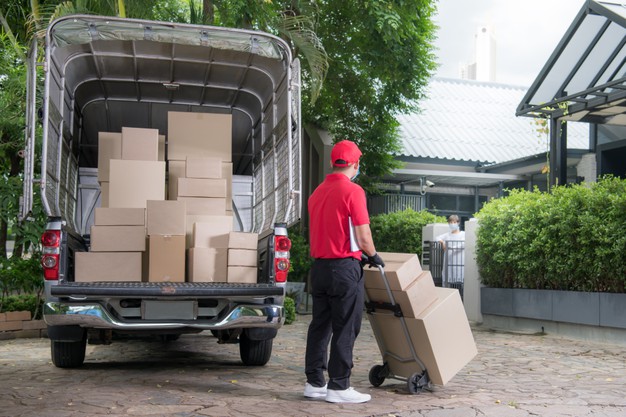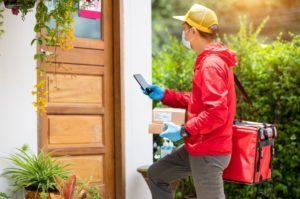The COVID-19 pandemic has caused a chaotic spike in the demand for deliveries of goods. Businesses have started to focus on re-evaluating their business models and getting closer to customers. Strict movement measures like the closing of retail outlets have led to a sudden rise in demand for home deliveries of essential and non-essential goods.
The rapidly shifting consumer behaviour has pushed last-mile logistics companies to make their deliveries quick, flexible, safe, and efficient.
What is the impact of Coronavirus on the last-mile delivery services?
It is crucial to understand the impact of COVID-19 on the last-mile delivery, as it affects the future of e-commerce, supply chains, and the entire delivery industry.
New services to prioritize safety
According to a Salesforce survey, contactless delivery is seeing a huge uptick, with 37% of U.S. consumers turning to it more than usual.
Global medical experts warn that coronavirus could be a health threat for years. Delivery agents are exploring new ways to keep customers happy without sacrificing safety. Apart from thermal monitoring and frequent use of sanitizers, it is crucial to avoid physical contact with customers. Contactless deliveries have become a new necessity in the delivery industry.
Last-mile delivery companies think that concerns about the safety of customers should not distance them from their relationships. Hence, they have started to make their delivery processes automated and digitized through Electronic Proof of Delivery software (e-POD). They have also enabled digital payment modes to minimize contact.
Online deliveries taking over brick-and-mortar stores
As customers are forced to remain indoors, they are dependent on online purchases more than ever before. Brick and mortar stores are falling short to meet high customer demands. Hence, many retail businesses heavily rely on online delivery options to keep their business afloat.
Today, last-mile logistics companies are partnering with retail outlets to enable hyperlocal deliveries. Many retailers have converted their unused facilities in stores to last-mile delivery warehouses. Based on customer expectations, they either function as a Cloud retail outlet or a BOPIS (Buy Online Pick up in Store) enabled shop.
Customers who want the convenience of online shopping and quicker deliveries prefer the BOPIS option. Brick and mortar stores have started to enable the BOPIS option to enhance their customer loyalty. Some retailers run Cloud retail shops to focus only on deliveries and not on foot traffic.
Optimizing routes for a quicker delivery
The accelerated conversion to online shopping has put an increased pressure on logistics companies to improve efficiencies. With an increased volume of parcels, last-minute changes in deliveries can cause unnecessary delays and reduce on-time deliveries.
Using a dynamic route optimization software helps companies integrate new orders into the system, and schedule deliveries accordingly. It ensures that drivers get regular updates about the best possible routes even after the last-minute changes in deliveries. It enables on-time deliveries of high volume parcels and also saves fuel costs.
Holiday seasons put increased pressure on last-mile delivery
A May 2020 survey of U.S. consumers found that compared to last year, 49 percent of respondents were more interested in shopping online for the holidays. A third of respondents was also more interested in buying online and picking their order up in-store.- Statista, June 2020, Compared to last year, how interested are you in shopping for the holidays in the following ways?
The holiday season during this pandemic may further multiply the burden on logistics. For better utilization of the existing fleet with higher volume deliveries, last-mile logistics companies expanded to seven days a week by introducing Sunday deliveries. This increased utilization maximizes stress on vehicles.
Fleet managers and drivers will have additional pressures to handle peak season deliveries. With hundreds of vehicles and drivers, fleet managers must ensure that they assign deliveries to riders accurately.
A dispatching software enables fleet managers to easily assign deliveries to drivers based on skill set, vehicle capacity, and so on. It also ensures territory/zone-based deliveries. Geocoding tools quickly convert improper addresses into accurate geographical coordinates, enabling an effective and optimal route.
Increased emphasis on driver performance

Image source: American Transport Research Institute (ATRI) and Independent Driver Association (IOA), MAR 2020.
Drivers have become an indispensable cog for successful on-time deliveries during this pandemic. Apart from addressing their safety concerns, logistics companies must focus on their performance.
Whether a driver takes unscheduled breaks or increases wait time during deliveries, it affects efficiency. A real-time fleet tracking software provides a comprehensive view of rider performance to logistics managers. Its ready-to-understand deep analytical insights on driver performance like idling time helps them assign future deliveries and rectify driving errors.
Enhanced focus on delivery experience
Today, last-mile logistics companies are focusing more on deliveries to people rather than places. Customers want greater control over deliveries, and this has increased after the COVID-19 pandemic. It has become challenging for logistics companies to enable fast and free delivery options. Beyond providing tracking details of parcels, they must ensure personal chat options to provide a personalized delivery experience. A last-mile tracking software provides transparency on deliveries and helps customers make changes to their delivery decisions.
Conclusion
Last-mile logistics companies are reinventing their business models, primarily due to COVID-19. A massive disruption in supply chains has led shoppers to spend less time in offline stores and more time in online stores. Hence, retailers are increasingly opting for last-mile delivery software to cater to the new demands of consumers. Technologies like a delivery logistics software can help them adapt their business to stay on top of the consumers’ demand.
About the Author:
Sandy.T. Melendez (Sandy) is a freelance content writer at Locus. She writes on topics like last-mile delivery, SaaS in logistics, E-commerce logistics and logistics technologies. Her hobbies include writing economic & financial analysis blogs and singing.




3 comments
I got what you mean ,saved to my bookmarks, very decent web site.
Very nice post! Thank you
I love this! Thank you
Comments are closed.